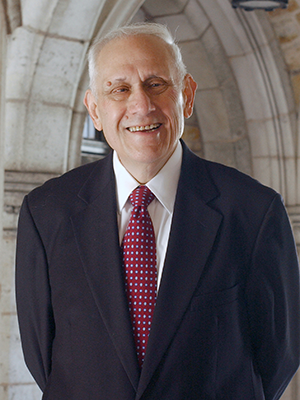Donald Kagan (1932 – 2021)

Donald Kagan, Sterling Professor Emeritus of Classics and History, prominent for his scholarship, teaching, and social and political commentary, and a longtime colorful figure at Yale, died Aug. 6 in a Washington D.C. retirement home. He was 89.
Kagan, who came to Yale in 1969, was a distinguished scholar of Ancient Greek history. His monumental four-volume history of the Peloponnesian War (1969–1987) was characterized by George Steiner as “the foremost work of history produced in North America in the 20th century.” Of the same work Joseph Manning, William K. and Marilyn M. Simpson Chair in History and in Classics, remarked, “Despite the vast mountain range of scholarship on Thucydides and the war that has been published since Kagan’s four-volume study, it remains required reading by all historians.”
Kagan’s gift was narrative: he was a superb story teller. In just the same way that he could mesmerize friends with a recapitulation of the movie “The Godfather,” or a crucial Yankees-Red Sox game, he could captivate readers when writing about complicated battles of the Peloponnesian wars.
I know I have enjoyed reading some of Kagan’s works (the most recent two were 2003’s The Peloponnesian War and Thucydides: The Reinvention of History) as well as sampling some of his lectures available at Open Yale Courses. That course, Introduction to Ancient Greek History, provides an overview of Greek history from the Dark Ages to the fall to Philip of Macedon in the third century B.C. Available at the course link are downloads of course materials and each lecture’s transcript. From the first lecture:
In my view, we need especially to examine the older traditions of the West that came before the modern era, and to take seriously the possibility that useful wisdom can be found there, especially among the Greeks who began it all. They understood the potentiality of human beings, their limitations and the predicament in which they live. Man is potent and important, yet he is fallible and mortal, capable of the greatest achievements and the worst crimes. He is then a tragic figure, powerful but limited, with freedom to choose and act, but bound by his own nature, knowing that he will never achieve perfect knowledge and understanding, justice and happiness, but determined to continue the search no matter what.
To me that seems an accurate description of the human condition that is meaningful, not only for the Greeks and their heirs in the West, but for all human beings. It is an understanding that cannot be achieved without a serious examination of the Western experience. The abandonment of such a study or its adulteration for current political purposes would be a terrible loss for all of humanity, and at the base, at the root of that civilization stood the Greeks. These are the reasons why I examined their experience and I trust why you are thinking about learning about it.
As he put it in a different quote: “Without history we are the prisoners of the accident of where and when we were born.” I’m sure many of his obituaries will focus on his politics, but it’s his work as a historian I’d rather remember since his works are perceptive and insightful.